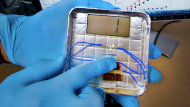Image credit: Berkeley Lab
Viruses might eventually be able to power the very phone, computer or tablet you're reading this article on. And we're not talking about those digital viruses or infestations - trojans, worms, and whatnot.
Scientists at the U.S. Department of Energy's Berkeley Lab have found a way to generate power using human viruses. Yes, those viruses inside your body. With a harmless specially engineered M13 virus, the group has been able to power a small display. The viruses can covert mechanical force into electricity.
"In near future, we believe that we can develop personal electric generators. Basically, all of our daily activity related to mechanical movement (or vibration): walking, jogging, typing, etc.," Seung-Wuk Lee, a faculty scientist in Berkeley Lab's Physical Biosciences Division, told ABC News. "For example, by installing our piezoelectric thin films on your shoes, we can convert our walking energy to electric energy. Therefore, with a phone in our pocket connected to our shoes, we can charge our phone."
So how does it all work? While there's lots of science to it all, the scientists tapped a finger on an electrode coated with the viruses and the viruses then converted the force of the tap into an electric charge.
And that force is critical to the equation. This is the first time electricity has been conducted by "harnessing the piezoelectric properties of biological material," Berkeley Lab's press release states. What that really means is that it is the first time electricity has been made by a combination of force and viruses.
But the scientists are picturing even broader uses. "In the future, because our M13 virus-based piezoelectric material is biocompatible, we can implant the virus-based piezoelectric power generatorin our body and capture our heart perspiration as a electric power source of the biomedical devices or biosensors. Therefore, no more charging of your pacemakers, hearing aids, personal health monitoring sensors," Lee explained.
However, this is still a ways out. According to Lee, the current power generation from the virus-based generator is not enough to power a phone yet.
"We are currently working on enhancing the power output of the virus-based piezoelectric generators," Lee told us. "Through our approaches, we believe that we can achieve power enhancement 100-1000 times and develop the personal power generator in near future."

No comments:
Post a Comment